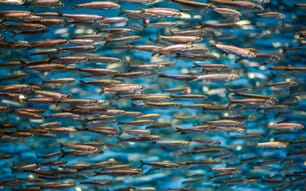The technology completely removes non-digestible carbohydrates (oligosaccharides) without compromising the amino acid composition, making it easier for fish to digest.
Initial testing has shown that EnzoMeal™, an improved soybean meal, outperforms 100 per cent fish meal diets.
“Ohio soybean farmers are excited to be able to meet an important need for aquaculture farmers,” said Nathan Eckel, chair of the OSC Research Committee.
“This technology shows tremendous promise.”
Soybean meal offers an attractive alternative to fish meal diet as it is rich in protein content compared to other agricultural based meals. Due to the high content of available protein, essential fatty acids, unsaturated fats, and a favorable amino acid profile, soybean meal closely meets the dietary requirements of fish. However, its application in the diets of some fish species is restricted to 20–30 per cent due to the dietary component that interferes with the digestion and absorption of nutrients.
Digestive systems particularly carnivorous fish are not accustomed to utilise plant ingredients such as soybean meal because it contains approximately 30 per cent of indigestible carbohydrates, including non-starch polysaccharides, and several compounds or anti-nutritional factors [ANFs; protease inhibitors, lectin, antigens (glycinin and b-conglycinin) and phytic acid] that may disturb the digestive process in fish.
Commercially important fish such as salmon and largemouth bass having lower activity of the enzymes needed to break down plant proteins and carbohydrates, therefore high inclusion of soybean meal can cause intestinal inflammation and organ damage.
The intestinal inflammation impedes the fish’s biological processes to break down proteins which fortify the accumulation of undigested nutrient load in excretion. These circumstances deteriorate the water quality, and complicate the health issues for the fish and other organisms sharing the habitat.
Further Trials Underway
Trials are underway and will verify the performance with salmon, largemouth bass and asian sea bass —three carnivorous fish that have particular issues with oligosaccharide-intensive crop-based meals. With these fish, demand is quickly outstripping supply, increasing the potential for aquaculture.
The potential to expand the ability to farm these profitable fish with a diet that entails a lower cost than traditional fish meal is a great opportunity to meet growing global demand for food and employ a cost-effective and proven crop in addressing that demand.
For more information on the technology, nutritional analysis, fish studies and commercialization please visit www.enzomeal.org.




